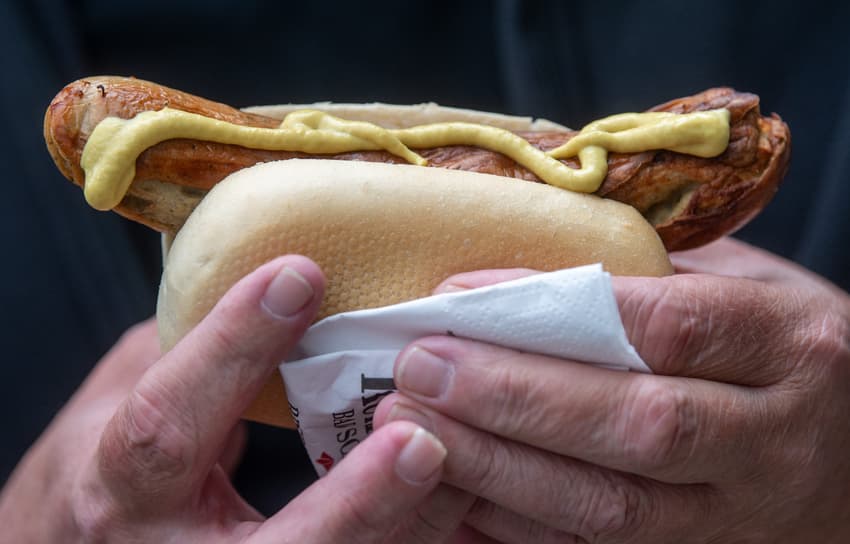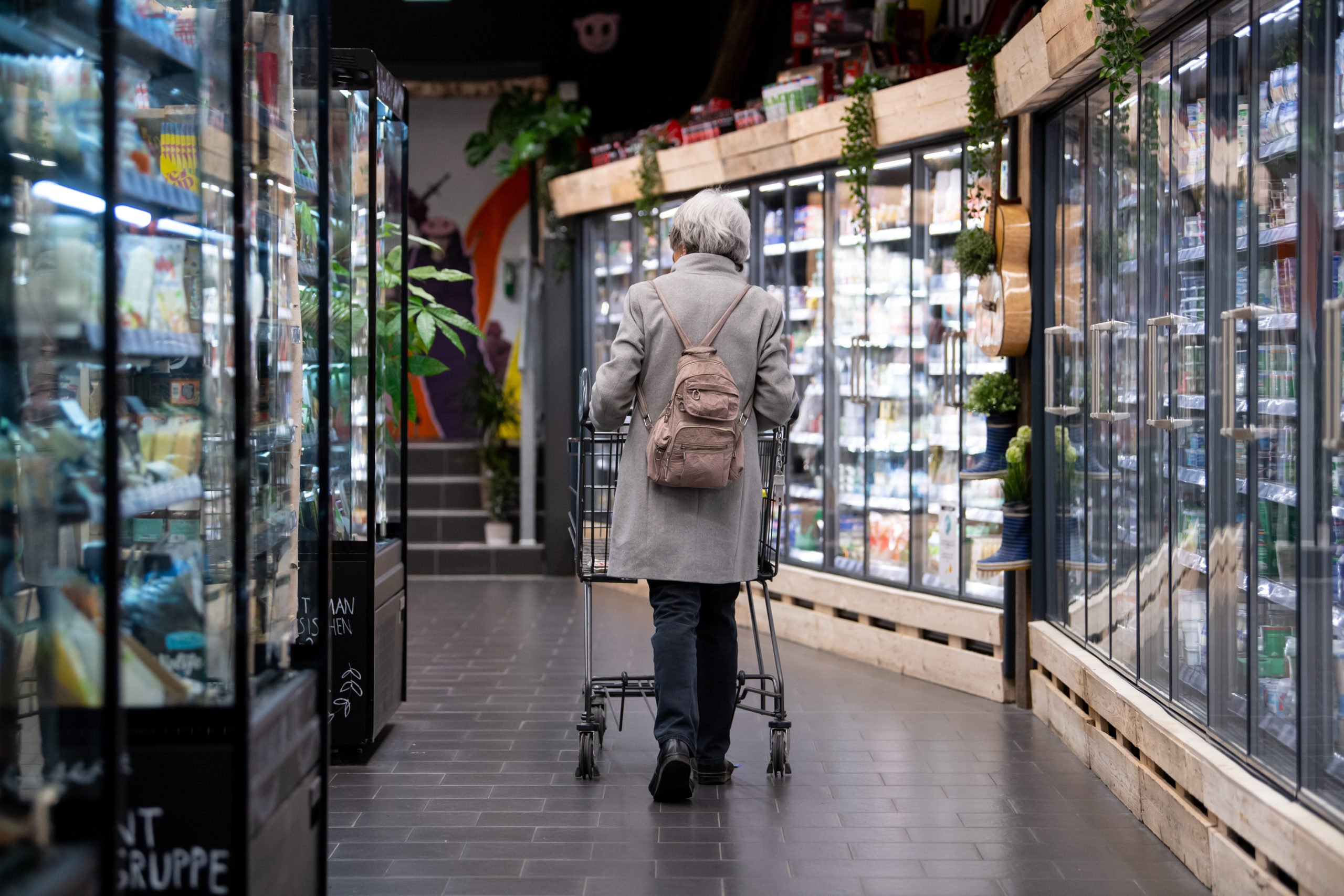What to know about the latest price hikes in German supermarkets

The cost of food and drink has been rocketing in Germany in recent months. We lay out some of the latest price hikes that may affect how you shop.
Supermarkets have been hiking up the cost of grocery products as inflation rises. And it's hard to escape - all branches of Aldi Süd, Aldi Nord, Lidl, Penny, Rewe, Edeka, Kaufland, Hit - and others - are affected.
German news site Focus Online gathered together a number of groceries going up in cost. We take a look at some of them, and how you can save money.
Butter
The price of butter has climbed to over €3 in many places. For a pack of Irish Butter from Kerrygold, consumers now have to pay around €3.39 instead of €2.89, from the previous week. That's a price increase of 17 percent.
Own-brand butter is cheaper at Aldi Süd, Aldi Nord, Lidl, Penny and Netto Marken-Discount. Consumers save about 30 cents compared to the branded product. But here, too, the 250 gram pack became 20 cents more expensive - it's going up to around €2.29.
READ ALSO: The grocery products in Germany getting more expensive
Milk (Milch)
Customers at Aldi and Lidl are facing price hikes on milk. The milk of the own brands Milfina and Milbona climbed from 88 cents to 92 cents. For the light version (1.5 percent fat content), you no longer pay 80 cents at the discounter, but 88 cents. That's a price increase of 10 percent.
The price development at brand manufacturers such as Weihenstephan, Bärenmarke and Landliebe is similar. A litre of milk is now priced at about €1.49. Last week, the upper limit was still €1.29. The price has climbed by about 16 percent in the last few days.

A shopper walks round a supermarket in Neubiberg, Bavaria. Photo: picture alliance/dpa | Sven Hoppe
Sour cream (Saure Sahne)
Sour cream is also more expensive now - prices have climbed by around 20 percent across the board. Sour cream from Milsani (Aldi Süd), Ja (Rewe) or Milbona (Lidl) still cost 42 cents last week. The new price is now 55 cents - an increase of 12 cents.
The branded product from Andechser (Natur Bio-Sauerrahm) is available at Edeka and Rewe stores for 99 cents. Last week, the product cost 85 cents.
Mustard (Senf)
The medium hot mustard from Rewe's own-brand - Ja - has been hiked up in price. The jar no longer costs 29 cents - instead it's 49 cents. This represents a price increase of 60 percent within the past week. Aldi Nord, Aldi Süd, Penny, Lidl and Netto Marken-Discount also increased the price of their low-priced mustard own brands by about 20 cents.
READ ALSO: Will Germany see a mustard shortage?
Breadcrumbs (Paniermehl)
If you want to bread a schnitzel, you have to dig deeper into your pocket because the cost of breadcrumbs (as well as meat) is going up.
Since last Thursday, the price of breadcrumbs has increased by 10 cents across the board. The cheapest product available is at discount supermarkets for 89 cents. The more expensive branded product is about €1.89.
Meat (Fleisch)
Rewe in Munich is charging €5.29 for a 400 gram pack of chicken schnitzel from its own brand Wilhelm Brandenburg. The week before, the price was €4.59. Edeka now charges €2.99 for its Bockwürstchen in a jar. Previously, the pack was available for €2.75.
Overall, consumers have had to pay more for meat in the frozen and refrigerated counters of discounters and supermarkets since last week. The price increases range from 40 cents to €1.60.
Discounter Aldi Nord, for example, no longer charges €5.99 for its own-brand bockwurst Gut Drei Eichen - it's now €7.19.
How you can save at the supermarket
Many of us do it anyway, but now is the time to be searching out for special offers. You could also think about buying own brands more often.
Pay attention to the best-before dates and only buy as much as you can and want to consume within a certain period of time. As a rule, consumers shouldn't hoard items because it causes supply issues, and it can contribute to waste.
READ ALSO: Why are people in Germany clearing out supermarket shelves?
Brochures, which can be found either in paper form or digitally, can also be helpful. You can find them in shops, in weekly newspapers or in the Apple and Google app stores. You can also get a hold of vouchers and discount codes this way.
In drugstore branches in Germany, voucher cards are often found on the shelf, which can also contribute to discounts. Plus, take advantage of online voucher offers to get a better price. Many retailers also use apps to attract customers.
Don't forget to keep a hold of your old bottles and claim back the Pfand (deposit). When you submit your empty bottles or cans, you get a receipt which you can use to either claim back the cash or to get money off your shopping.
READ ALSO: Six essential tips on how to save money on your groceries
Comments
See Also
Supermarkets have been hiking up the cost of grocery products as inflation rises. And it's hard to escape - all branches of Aldi Süd, Aldi Nord, Lidl, Penny, Rewe, Edeka, Kaufland, Hit - and others - are affected.
German news site Focus Online gathered together a number of groceries going up in cost. We take a look at some of them, and how you can save money.
Butter
The price of butter has climbed to over €3 in many places. For a pack of Irish Butter from Kerrygold, consumers now have to pay around €3.39 instead of €2.89, from the previous week. That's a price increase of 17 percent.
Own-brand butter is cheaper at Aldi Süd, Aldi Nord, Lidl, Penny and Netto Marken-Discount. Consumers save about 30 cents compared to the branded product. But here, too, the 250 gram pack became 20 cents more expensive - it's going up to around €2.29.
READ ALSO: The grocery products in Germany getting more expensive
Milk (Milch)
Customers at Aldi and Lidl are facing price hikes on milk. The milk of the own brands Milfina and Milbona climbed from 88 cents to 92 cents. For the light version (1.5 percent fat content), you no longer pay 80 cents at the discounter, but 88 cents. That's a price increase of 10 percent.
The price development at brand manufacturers such as Weihenstephan, Bärenmarke and Landliebe is similar. A litre of milk is now priced at about €1.49. Last week, the upper limit was still €1.29. The price has climbed by about 16 percent in the last few days.

Sour cream (Saure Sahne)
Sour cream is also more expensive now - prices have climbed by around 20 percent across the board. Sour cream from Milsani (Aldi Süd), Ja (Rewe) or Milbona (Lidl) still cost 42 cents last week. The new price is now 55 cents - an increase of 12 cents.
The branded product from Andechser (Natur Bio-Sauerrahm) is available at Edeka and Rewe stores for 99 cents. Last week, the product cost 85 cents.
Mustard (Senf)
The medium hot mustard from Rewe's own-brand - Ja - has been hiked up in price. The jar no longer costs 29 cents - instead it's 49 cents. This represents a price increase of 60 percent within the past week. Aldi Nord, Aldi Süd, Penny, Lidl and Netto Marken-Discount also increased the price of their low-priced mustard own brands by about 20 cents.
READ ALSO: Will Germany see a mustard shortage?
Breadcrumbs (Paniermehl)
If you want to bread a schnitzel, you have to dig deeper into your pocket because the cost of breadcrumbs (as well as meat) is going up.
Since last Thursday, the price of breadcrumbs has increased by 10 cents across the board. The cheapest product available is at discount supermarkets for 89 cents. The more expensive branded product is about €1.89.
Meat (Fleisch)
Rewe in Munich is charging €5.29 for a 400 gram pack of chicken schnitzel from its own brand Wilhelm Brandenburg. The week before, the price was €4.59. Edeka now charges €2.99 for its Bockwürstchen in a jar. Previously, the pack was available for €2.75.
Overall, consumers have had to pay more for meat in the frozen and refrigerated counters of discounters and supermarkets since last week. The price increases range from 40 cents to €1.60.
Discounter Aldi Nord, for example, no longer charges €5.99 for its own-brand bockwurst Gut Drei Eichen - it's now €7.19.
How you can save at the supermarket
Many of us do it anyway, but now is the time to be searching out for special offers. You could also think about buying own brands more often.
Pay attention to the best-before dates and only buy as much as you can and want to consume within a certain period of time. As a rule, consumers shouldn't hoard items because it causes supply issues, and it can contribute to waste.
READ ALSO: Why are people in Germany clearing out supermarket shelves?
Brochures, which can be found either in paper form or digitally, can also be helpful. You can find them in shops, in weekly newspapers or in the Apple and Google app stores. You can also get a hold of vouchers and discount codes this way.
In drugstore branches in Germany, voucher cards are often found on the shelf, which can also contribute to discounts. Plus, take advantage of online voucher offers to get a better price. Many retailers also use apps to attract customers.
Don't forget to keep a hold of your old bottles and claim back the Pfand (deposit). When you submit your empty bottles or cans, you get a receipt which you can use to either claim back the cash or to get money off your shopping.
READ ALSO: Six essential tips on how to save money on your groceries
Join the conversation in our comments section below. Share your own views and experience and if you have a question or suggestion for our journalists then email us at [email protected].
Please keep comments civil, constructive and on topic – and make sure to read our terms of use before getting involved.
Please log in here to leave a comment.